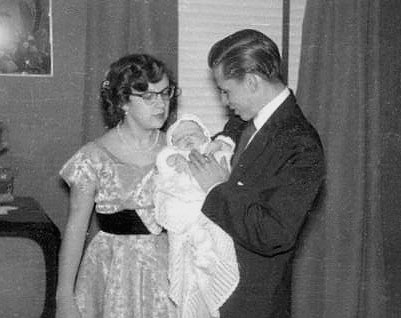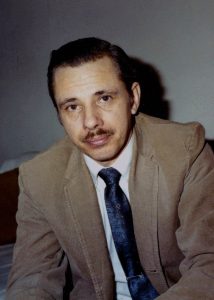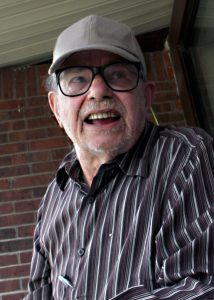He did not care for his name, either his given one—Henry—or the nickname he ended up being known by, Hank. At his last job, he became known as Hank the Crank. It was an affectionate sobriquet. He managed a department full of engineers and took care of them. One of the first things he did when he took over was get them all raises which had been long overdue.
He flourished in that job. At the end of decades of struggling, moving from one place of employment to another, seeing opportunities die, usually in the mismanagement of others, he came to a place where all his unique and quirky skills and proclivities came together. For the years he managed that department, he was, as they say, in his glory. It was good to see him so enthused, all his faculties engaged. He would have worked at that till he died given the chance, but once again forces beyond his control took it away.
But he retired with his wife, my mother (though it was a few more years before she left the working world), and they bought a new house and settled into a suburban neighborhood (to my surprise, actually) to enjoy each other. I think they did. For a couple of decades they were able to be with each other in a way they might only have imagined possible.
Then the health problems began. Little by little, this man I had viewed as a kind of superman began to diminish. He had always been a private and often reticent man, so complaining was not part of his repertoire. It must be said that had he complained a bit more, things might have been easier for him. But he had difficulty admitting he needed help and for most of his life he had always been the one to be relied upon by those around him.
Compensation for his willingness to Be There had never been a consideration
My parents’ romance was the stuff of movies. They certainly didn’t see it that way, but when you hear the way it happened you can’t help but be charmed. He was in the army, stationed at Fort Leonard Wood. After basic training, his original unit was set to ship out to Spain, but he was pulled at the last minute because of his teeth. On his first leave, he and a buddy came up to St. Louis. They were at the Hilands, which used to sit on the ground that now supports Forest Park Community College. The Hilands was an amusement park, right on the edge of Forest Park. After a day of enjoying the rides and attractions, they were about to try to find a hotel. At the bus stop, they spotted two girls. They approached looking for directions and ended up riding the bus with them down town.
Dad must have been immediately smitten. Soon enough they were exchanging letters. Mom told me he very quickly wanted to meet her parents. At some point, she became smitten, too.
They decided not to marry until after his service was done. He was cognizant of the possibility of injury and had scruples about burdening her with an invalid, but the fact is he never saw combat. He ended up on Hokkaido across a stretch of water from Korea and never jumped off into the fray. He came home intact and they married on New Years Eve 1953.
I was born in October 1954.
 From all I have gathered, dad did everything he could to make a fine and nurturing home. He had come from domestic circumstances that were far from ideal, from an alcoholic and abusive father and an apparently resentful if dutiful mother. He had been a late baby for her, giving birth to him when she was 40. While that is less uncommon today, in 1930 that was not only unusual but entailed more risk. There was a considerable age difference between Henry and his siblings and he ended up the last to leave home, which he had to do under fraught circumstances. It seemed that he was determined to do better for his own family.
From all I have gathered, dad did everything he could to make a fine and nurturing home. He had come from domestic circumstances that were far from ideal, from an alcoholic and abusive father and an apparently resentful if dutiful mother. He had been a late baby for her, giving birth to him when she was 40. While that is less uncommon today, in 1930 that was not only unusual but entailed more risk. There was a considerable age difference between Henry and his siblings and he ended up the last to leave home, which he had to do under fraught circumstances. It seemed that he was determined to do better for his own family.
And he did.
It has taken me a lifetime to appreciate what he did.
When you grow up in a bubble it never occurs to you to examine the surface of the bubble. As with most people probably, I underappreciated what my parents were like and what they did for me. In the last few years, I’ve been having longer and deeper conversations with my mom and I’ve been learning things about dad I might have suspected but never knew. I always knew, for instance, that he’d had a rough childhood, that his father was bitter and often cruel, but I never knew quite how deep the ambivalence ran with his mother and some of the details about his siblings…
All that to give context to the fact that he did a phenomenal job of breaking a nasty cycle. I was cherished and nurtured and provided with a wonderful example of a mature relationship because it has always been obvious that my parents were crazy about each other and also best friends. They shared a true partnership. In the context of the times, this is a remarkable thing. Dad insisted that mom have her own credit card and have her own car. He fostered her independence.
The biggest source of friction between my dad and me had to do with that. Independence. He wanted above all to be sure I was prepared for it. It seemed he often despaired of that since I seemed not to Get It. He was a Depression Baby, I was raised in a comfortable home and need was kept at bay to give me room to be what my dad had never had much chance of being—a kid. So our apprehension of the world conflicted. Even so, he did not back off from care and sustenance and respect. He suffered silently for the most part and hoped things would come out right.
He served in the army, came home, married my mom, and then landed a job at Remington Rand as an office machine repairman. At the time it was a well-paid job. During that time he and mom converted to Mormonism, which in hindsight was weird. Then came the first major break in what I eventually realized was my dad’s inability to compromise on certain principles. The church abused his fidelity and suggested going around The Rules so he could take on work they wanted him to do. When he called them on it, their response drove him to sever ties. I learned eventually that he was what I came to call a 110 percenter. He committed, he gave more than his all, but there was an implicit understanding that the thing he committed to must be just as committed as he was. He walked away from jobs, a church, a business he loved because it had become compromised and soured for him. If he felt his integrity was at stake, he walked away.
He taught himself machining and worked for many years as a journeyman machinist. This led to better money than he had been making and things got easier. During this period, he became a Freemason. One is never not a mason, so while his ardor cooled, that tie was never broken.
We did not quite Get each other. He tried. He tried harder than I knew. When I found something new, he was interested. The closest we came to sharing a passion was photography. He simply did not have time to get into it the way I did, but he always supplied me, and it led to a career. When I made my first few forays into writing fiction, he took an interest, but we both realized quickly that he would not be a useful critic, but he was clearly proud of me when I published my first stories and then novels. He would brag about me to strangers.
For all that he was a gregarious man, he was intensely private. As the world changed around him, many of our conversations took on a tone of bewilderment, sometimes anger, but he always tried to understand. Always. That willingness to try set him apart from so many people I have known. That he succeeded as often as he did amazed me. I can only hope I returned the courtesy.
He lost he eyesight and his hearing. Arthritis took his ability to get around and he began falling. Finally, one night, mom called me to come help. She could not get him up. We spent a few days until finally she called 911 and they took him to the hospital. From there, he went to a care facility. We were very lucky in the quality of the place. They cared, they gave a damn, and he became, as so often happened with him, popular with the staff, even though he could not communicate very well.
He was there two-and-a-half years and for most of that time he was stable. Last week he stopped eating. We saw him one day and he was clearly struggling, but there wasn’t anything specifically wrong with him. This past Friday he passed. The staff gave his body a surprising send-off.
I am a child of the whole self-analysis era. I learned the hard way, though, that leaving things unsaid is both unnecessary and harmful, so dad and I had had our “final” conversations. We had no unfinished business. That in itself does not secure one from pain. But it is not, for the moment, the raging pain of someone who failed at important exchanges. Dad and I were good with each other. No regrets.
But I am sad. Not that he’s no longer in an absurdly unpleasant situation—he had been vital and active most of his life, to see him unable to walk down a hall was difficult—but that he is gone from everything but memory. He mattered to people who came to know him. He was a Presence.
I love him. He was a great dad. And a good man.

